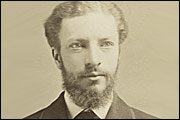Ethical Culture's humanist legacy
Unitarianism and Universalism have been liberal religious cousins to the Ethical Culture movement since its founding in 1876. Now an Ethical Society has joined the UUA.
Along that route you’ll see the Romanesque-style Universalist National Memorial Church, which calls itself liberal Christian. At Harvard Street, you’ll pass the Georgian spire of All Souls Unitarian Church, rooted in the social justice movements of Unitarianism. At the very northern tip, where D.C. meets Maryland, you’ll find the newest kid on the block: the low, modern, glass-and-brick meetinghouse of the humanist Washington Ethical Society (WES), which this year joined the Unitarian Universalist Association.
As liberal religious traditions, Unitarianism and Universalism have been cousins to the Ethical Culture movement since its founding by 24-year-old Felix Adler in New York City in 1876.
In his early career, the German-born Adler preached at Temple Emanu-El, where his father served as one of New York’s most prominent rabbis. Dismayed by 3,000 years of bloodshed and division over religious beliefs, Adler called for the creation of “an institution for saving men morally, for helping them to make [the] effort toward goodness, without having for its basis any accepted common formula or creed.”
A charismatic leader and powerful orator, Adler preached sermons—or “platforms” as they’re called in Ethical Culture—urging “deed over creed” for the next forty years. His Ethical Societies, which are the individual congregations, would help found the Visiting Nurses Association and a free Brooklyn kindergarten to serve the poor, and would work to improve tenement conditions and strengthen child labor laws.
One hundred Temple Emanu-El members followed the younger Adler, and the movement caught on, also attracting radical Unitarians, Universalists, Quakers, and others. In the early 1880s, Adler also served as president of the Free Religious Association, an organization founded in Boston largely by Unitarians who disagreed with the National Conference of Unitarian Churches.
The cross-pollination continues today. Unitarian Universalist ministers often consult with or lead Ethical Societies. The Rev. Richard Nugent, a UU minister, has served WES for two years, and this fall the Rev. Amanda Poppei will begin her first settled position there. But the Washington Ethical Society’s affiliation with the UUA marks the first formal union of the two entities.
The affiliation holds another distinction as well. Currently, twenty-six other federated congregations hold joint affiliations with the UUA and another denomination. Most of those affiliations are with United Church of Christ congregations. The Washington Ethical Society, which maintains its affiliation with the American Ethical Union (AEU), is however the UUA’s first federated congregation with a humanist identity.
The second largest Ethical Society, with 300 adult members and 60 youth, WES increasingly had “institutional frustration,” said Sunday school director Peggy Goetz. It needed more training, educational materials, and consultation on running and financing its organization than the AEU, with its small staff, could provide—all needs the UUA can help meet.
Some WES members were hesitant because of a perception that UU churches are predominantly Christian. The six members who came to the 2008 UUA General Assembly were delighted to discover a range of beliefs, just as in Ethical Culture, and especially a strong UU humanist tradition. Ethical Culture’s four principles resonate closely with Unitarian Universalism’s, which also speak of each person’s inherent worth and the interdependence of all life.
“Our vision of how we’re part of the web of life is first and foremost through the connections we have with others,” WES community leader Mary Herman said. “We create a better world through acts of kindness and social responsibility. When we do that, we attain a glimpse of something sacred and precious in life. That’s where our reverence comes from.”
See sidebar for links to related resources.








